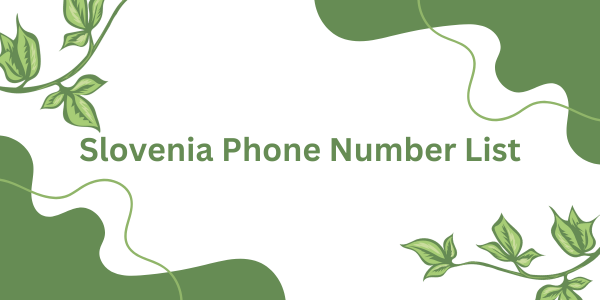|
|
Slovenia is a resource-rich country with a variety of natural resources that support its economy and industries. Despite its relatively small size, the nation possesses diverse mineral, agricultural, and forest resources, as well as abundant water resources.
1. Mineral Resources:
Slovenia is endowed with a variety of mineral resources, which have supported Slovenia Phone Number List its mining and industrial sectors. The most important minerals include:
Coal: Slovenia has coal deposits, primarily lignite, which have historically fueled its power generation. However, the importance of coal has declined due to environmental concerns.
Metallic minerals: Zinc, lead, and other non-ferrous metals are mined, with the country focusing on environmentally sustainable mining methods.
Non-metallic minerals: Limestone and clay are abundantly available and are key resources for construction, cement production, and other industries.
2. Forest Resources:
Forests cover over 60% of Slovenia’s territory, making forestry one of the most important natural resources. The country has a rich diversity of forested areas with species like oak, beech, and pine. Slovenia's forests are well-managed and provide timber for construction, furniture-making, and the paper industry. Moreover, the forestry sector supports ecological preservation and biodiversity conservation.
3. Agricultural Land and Resources:
Slovenia’s fertile agricultural land supports diverse crops and livestock farming. Major agricultural resources include:

Crops: Wheat, barley, corn, and other cereals are widely cultivated. Slovenia also produces fruits and vegetables such as apples, potatoes, and grapes.
Livestock: Cattle, pigs, and poultry farming are common, with dairy production playing a significant role.
Agricultural practices in Slovenia focus on organic farming and sustainability to ensure food security and environmental preservation.
4. Water Resources:
Slovenia has abundant freshwater resources due to its mountainous terrain, rivers, and lakes. The Sava River, Soča River, and numerous smaller rivers are vital for drinking water, agriculture, and hydroelectric power. Hydropower contributes significantly to Slovenia’s renewable energy portfolio, and water resources are used extensively for fish farming and tourism purposes.
5. Other Natural Resources:
Slovenia is also known for its natural beauty, which supports eco-tourism, and has deposits of natural gas used for energy production. Additionally, its natural landscapes support renewable energy projects like solar and wind power installations.
Overall, Slovenia's natural resources—spanning minerals, forests, agricultural land, and water—support its economic stability while aligning with the country's sustainable development and environmental protection goals.
|
|